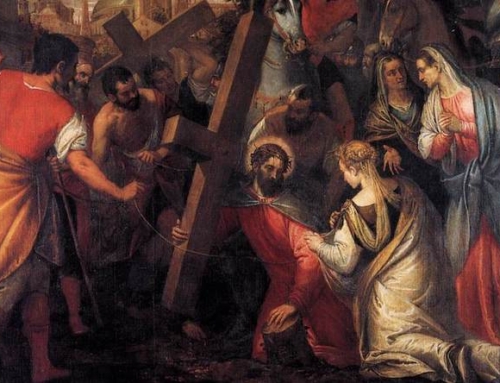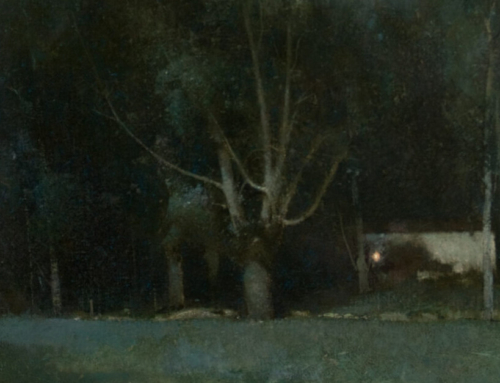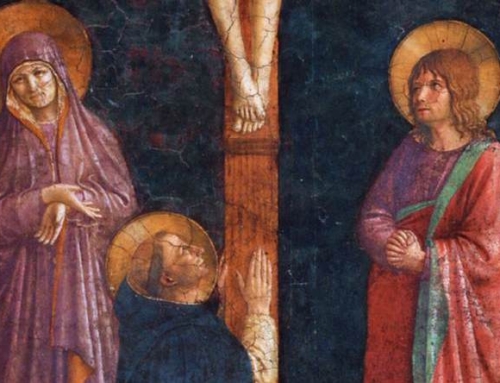Saint Thomas Aquinas revered the Fathers of the Church, that class of ecclesiastical luminaries that includes such giants as St. Augustine, St. John Chrysostom, St. Jerome, and St. John Damascene. Aquinas knew these early theologians and their writings thoroughly: his Catena Aurea, a commentary on the Four Gospels composed entirely of quotations from the Fathers, is one of the most remarkable and insightful collections of patristic literature ever compiled. His Summa Theologiae is filled with references to the Fathers as authoritative teachers of the Catholic Faith.
At the same time, Aquinas always kept the authority of the Fathers in the proper perspective. When considering the nature of theological science, St. Thomas affirms that the authority of the “Doctors of the Church” (those whom we would refer to as “Fathers”) is a proper authority for theology, but secondary to that of the Sacred Scriptures (ST I, q. 1, a. 8). He likewise emphasizes the priority of the Church’s magisterium in all matters concerning the faith: “We ought to abide by the authority of the Church rather than by that of an Augustine or a Jerome or of any doctor whatever” (ST II-II, q. 10, a. 12). Saint Thomas’s goal in studying the Fathers was not ultimately to understand them, but to understand God. As one scholar summarizes Aquinas’s approach to the holy doctors, “Thomas was not interested in a historical study of the Fathers, but in discovering, with their help, a more profound understanding of the mysteries of the faith” (Leo Elders, Thomas Aquinas and His Predecessors, 103).
His approach to the Fathers was therefore critical, in the sense of being reasoned. He sought to understand, and not merely repeat, what had been said before. At one point, Aquinas considers whether one ought to rely more on reason or authorities in resolving theological questions. In response, he declares: “If with bare authorities a master should determine a question, a certain hearer shall be certified that it is such, but shall acquire nothing of science or understanding but shall depart empty” (Quodlibet. IV, q. 9, a. 3). In other words, if one simply repeats a given saying of an authority and does not try to understand it or to judge it in light of the faith as a whole, one can neither progress in knowledge of the faith nor share that knowledge with others. Theology requires not simply memories, but minds.
Aquinas’s concern for the truth of the faith sometimes entailed gentle corrections of his predecessors. He modeled what can be termed the “reverential exposition” of those patristic writings that contain difficulties, especially in light of the fuller understanding of certain doctrines that came with the passage of time. He explains: “If there are found some points in statements of the ancient Fathers not expressed with the caution moderns find appropriate to observe, their statements are not to be ridiculed or rejected; on the other hand neither are they to be overextended, but reverently interpreted” (Contra Errores Graecorum, prologue).
Saint Thomas was a docile student, and that made him the best of teachers. Pope Leo XIII, quoting the great Thomist Cardinal Cajetan, famously said of St. Thomas that, “because ‘he most venerated the ancient doctors of the Church, in a certain way [he] seems to have inherited the intellect of all’” (Aeterni Patris, 17). Aquinas received the saving doctrine handed down to him, plumbed its depths by the light of reason and God’s grace, and handed it on with greater order and clarity for the sanctification of all who would follow him—including us today. His reception of the Fathers points us beyond the Fathers to the source and goal of all theology, God himself. As Andrew Hofer, O.P. explains, St. Thomas’s theology “is not about himself or about those upon whom he relies for assistance, but it is about God. We come by faith to the mind of God with the saints now, so as to approach the mind of God with the saints in heaven” (Thomas Aquinas and the Greek Fathers, 311).
With this in mind, we at Dominicana offer you a series of posts—four over the next four Saturdays—to illustrate how St. Thomas received the wisdom of the ancient Church. Our hope is that, in reading these posts, you will learn more about Aquinas and the Fathers and—more importantly—that you will learn from them about God.
✠
Image: Francisco de Zurbarán, The Apotheosis of St. Thomas of Aquino







